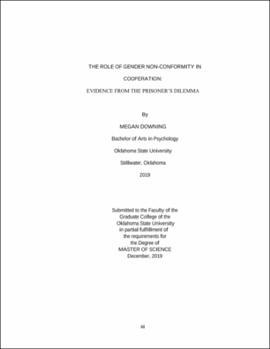| dc.contributor.advisor | Kennison, Shelia | |
| dc.contributor.author | Downing, Megan | |
| dc.date.accessioned | 2020-08-24T16:47:25Z | |
| dc.date.available | 2020-08-24T16:47:25Z | |
| dc.date.issued | 2019-12 | |
| dc.identifier.uri | https://hdl.handle.net/11244/325408 | |
| dc.description.abstract | This study examined the relationship between gender conforming individuals and cooperative behavior when participants are partnered with a gender conforming or non-conforming "partner." Cooperation has been a key development in human advancement (Argyle, 1991; Johnson & Johnson, 2011; Tyler, 2011). The ability to put aside conflicts and differences to create a workable and productive atmosphere is foundational to our success as a species. Many experimental methods exploring cooperation have involved social and economic dilemma games, such as the Prisoner's Dilemma Game (PDG), pitting partners against each other to investigate when cooperation occurs and when it does not (Argyle, 1991; Balliet, Li, Macfarlan & Yan, 2011; Balliet & Lang, 2013; Tucker, 1983). | |
| dc.description.abstract | Much of the research on cooperation has focused on those elements that determine non-cooperation, such as in-group/out-group behavior. Conformity to group norms or social identities, such as race or religion, have been found to be contributors to determining in-group/out-group bias (Turner, 1987; Williams, 2001). One social norm that can affect in-group/out-group dynamics is gender conformity (Horn, 2007; Marques, Abrams & Serodio, 2001; Stenberg, Beall & Eagly, 2004). Individuals who are not perceived as gender-conforming can face rejection from their peers (Lamb, Easterbrooks & Holden, 1980; Sternberg et al., 2004; Zucker, Wilson-Smith, Kunita & Stern, 1995). | |
| dc.description.abstract | The present research study investigated the relationship between gender conforming individuals and cooperative behavior when partnered with a gender non-conforming individual. This research explored whether conformity to gender norms played a distinct role in the in-group/out-group dynamic, utilizing the Prisoner's Dilemma Game and its cooperative choices paradigm. Participants were recruited through the online system SONA and randomly assigned to one of four possible conditions (a prompt introducing a partner who is either male gender conforming, male gender non-conforming, female gender conforming, female gender non-conforming). Initial analysis evaluating correlational relationships between femininity/masculinity scores and choice revealed that for women scoring higher in femininity, they were less likely to cooperate with a male non-conforming partner. | |
| dc.format | application/pdf | |
| dc.language | en_US | |
| dc.rights | Copyright is held by the author who has granted the Oklahoma State University Library the non-exclusive right to share this material in its institutional repository. Contact Digital Library Services at lib-dls@okstate.edu or 405-744-9161 for the permission policy on the use, reproduction or distribution of this material. | |
| dc.title | Role of gender non-conformity in cooperation: Evidence from the Prisoner's Dilemma | |
| dc.contributor.committeeMember | Schrader, David | |
| dc.contributor.committeeMember | Byrd-Craven, Jennifer | |
| osu.filename | Downing_okstate_0664M_16077.pdf | |
| osu.accesstype | Open Access | |
| dc.type.genre | Thesis | |
| dc.type.material | Text | |
| dc.subject.keywords | cooperation | |
| dc.subject.keywords | gender conformity | |
| dc.subject.keywords | prisoner's dilemma | |
| thesis.degree.discipline | Psychology | |
| thesis.degree.grantor | Oklahoma State University | |
